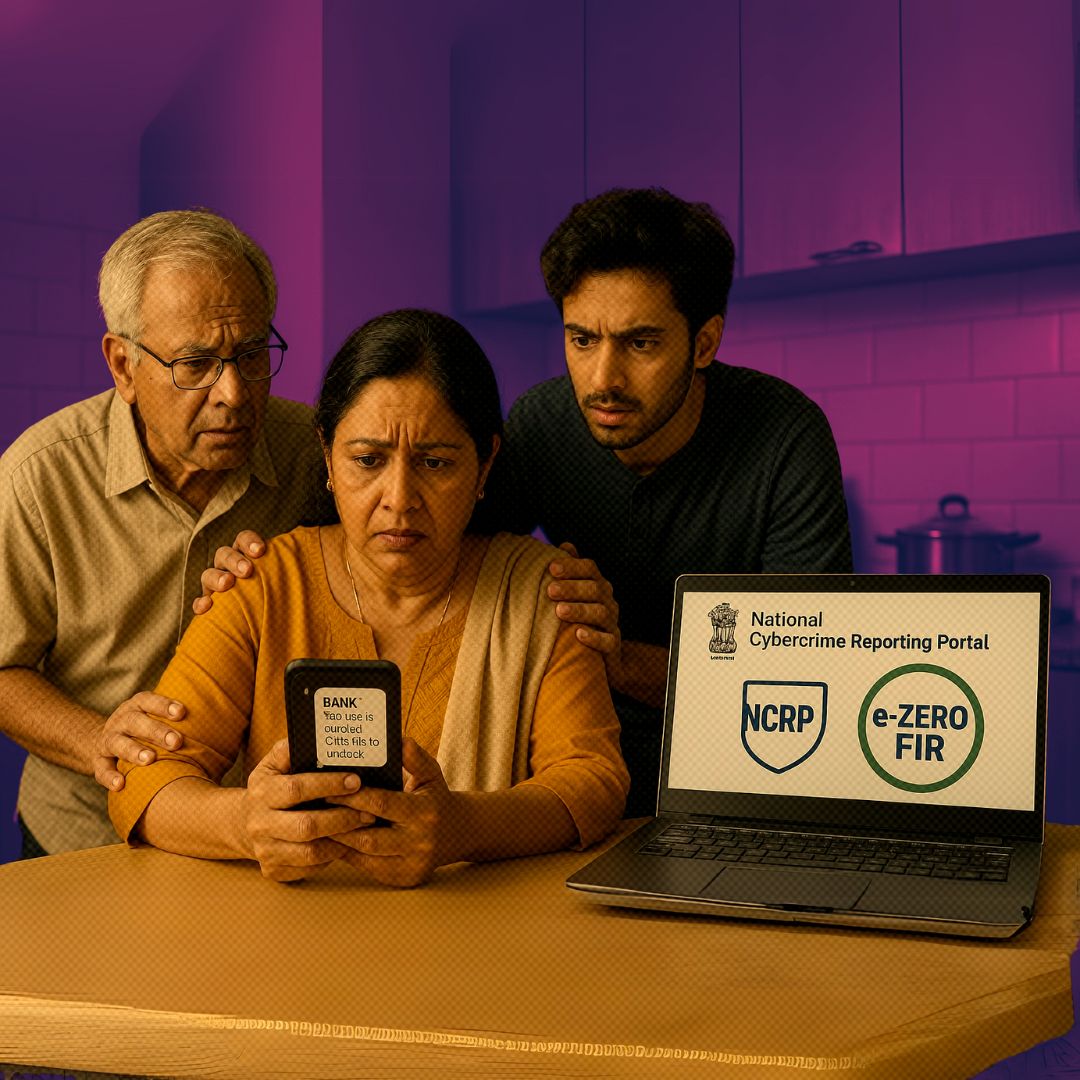The Ministry of Home Affairs (MHA) has introduced the e-Zero FIR system as a pilot project in Delhi, allowing victims of cyber financial frauds involving amounts above ₹10 lakh to report crimes instantly online without the need to visit police stations or worry about jurisdictional delays.
Complaints filed through the National Cybercrime Reporting Portal (NCRP) or the helpline number 1930 are automatically converted into Zero FIRs and forwarded to the relevant police stations for investigation. Victims are required to visit the concerned police station within three days to convert the Zero FIR into a regular FIR.
This initiative aims to expedite the reporting and investigation process for high-value cybercrimes and is planned for expansion across India, reinforcing the government’s commitment to creating a cyber-secure Bharat.
A Tech-Driven Leap Against Online Scams
India has witnessed a steep rise in cyber frauds in recent years, with scams ranging from fake UPI payment links, fraudulent job offers, to phishing attacks that drain victims’ bank accounts within minutes. Recognising the urgent need for a faster and more accessible reporting mechanism, the Ministry of Home Affairs, through its Indian Cybercrime Coordination Centre (I4C), has launched the e-Zero FIR system.
Union Home Minister Amit Shah stated, “This initiative will enable victims to act immediately and ensure that criminals are caught swiftly without the usual delays caused by jurisdictional confusion or manual FIR registration.”
The system integrates the NCRP, Delhi Police’s e-FIR portal, and the National Crime Records Bureau’s Crime and Criminal Tracking Network & Systems (CCTNS), creating a seamless digital interface that automatically registers FIRs for cyber fraud complaints exceeding ₹10 lakh.
This automation is expected to significantly reduce the time lag between reporting and investigation, enabling law enforcement agencies to freeze transactions and apprehend offenders more efficiently.
Background: Responding to a Growing Threat
Cybercrime in India has grown exponentially, with the country ranking among the top targets globally for online fraud. Previously, victims faced multiple hurdles—traveling to police stations, dealing with jurisdictional ambiguities, and enduring slow FIR registration processes—that often resulted in lost evidence and delayed justice.
The e-Zero FIR system addresses these challenges by allowing victims to lodge complaints online from anywhere in the country. Under Section 173 of the Bharatiya Nagrik Suraksha Sanhita (BNSS), 2023, this system enables FIR registration irrespective of the victim’s or offender’s location, ensuring a unified and efficient approach to cybercrime reporting.
While the current pilot focuses on Delhi and cases involving losses above ₹10 lakh, the government has announced plans for a phased nationwide rollout, aiming to empower more citizens and strengthen India’s cybercrime deterrence.
The MHA's Indian Cybercrime Coordination Centre (I4C) introduced the new e-Zero FIR initiative to nab any criminal with unprecedented speed. Launched as a pilot project for Delhi, the new system will automatically convert cyber financial crimes filed at NCRP or 1930 to FIRs,…
— Amit Shah (@AmitShah) May 19, 2025
News in Q&A
1. What is the e-Zero FIR initiative and why has it been launched?
The e-Zero FIR is a new system launched by the Ministry of Home Affairs to automate the registration of FIRs for cyber financial frauds above ₹10 lakh, starting as a pilot in Delhi. It aims to address the growing menace of online scams by eliminating delays and jurisdictional barriers in reporting and investigating cybercrimes. The initiative is part of the government’s broader strategy to modernise and strengthen India’s cybersecurity infrastructure and will soon be expanded nationwide.
2. How does the e-Zero FIR system work and who can use it?
Victims of cyber financial frauds involving losses above ₹10 lakh can file complaints through the National Cybercrime Reporting Portal (NCRP) or by calling helpline 1930. The system automatically converts eligible complaints into Zero FIRs, which are registered electronically at the e-Crime Police Station in Delhi and then routed to the relevant territorial police station. Complainants must visit the police station within three days to convert the Zero FIR into a regular FIR, enabling formal investigation and legal action.
3. What are the latest developments and official statements regarding the initiative?
Launched on May 19, 2025, the pilot is currently operational in Delhi, with plans for nationwide rollout. Union Home Minister Amit Shah stated, “The new system will automatically convert cyber financial crimes filed on the National Cybercrime Reporting Portal (NCRP) and helpline number 1930 to FIRs, initially above the threshold limit of Rs 10 lakh,” emphasising the government’s commitment to building a cyber-secure India and nabbing criminals with unprecedented speed.
4. What are the main features, benefits, and limitations of the e-Zero FIR system?
Key features include automatic FIR registration for high-value cyber frauds, faster investigative response, and improved coordination between agencies. The system increases accountability and transparency, boosting public trust in cyber safety infrastructure. However, its current limitation is the ₹10 lakh threshold, which excludes many victims of lower-value frauds. The government has not yet provided a rationale for this threshold but may refine the system based on pilot outcomes.
5. What is the background and context behind this move, and what are the broader implications?
India has seen a rapid increase in cyber financial crimes, with victims often facing delays and procedural hurdles in getting cases registered. Traditionally, complaints took time to be converted into FIRs due to verification and jurisdictional issues. The e-Zero FIR initiative addresses these challenges by leveraging technology to streamline the process. While the move is widely seen as a step forward in protecting citizens and modernising law enforcement, it has sparked debate over inclusivity and the need to support all victims, regardless of the amount lost.
The Logical Indian’s Perspective
The launch of the e-Zero FIR initiative is a commendable step towards making India’s digital space safer and more accountable. By harnessing technology to remove bureaucratic roadblocks, the government is not only improving the efficiency of law enforcement but also restoring faith among citizens who often feel helpless after falling victim to online scams.
However, the ₹10 lakh minimum threshold for automatic FIR registration may inadvertently exclude many victims of smaller but equally distressing cyber frauds, who continue to face challenges in reporting and obtaining timely justice.
It is crucial that as this system expands, it becomes more inclusive and accessible to all, regardless of the amount lost. At a time when digital transactions are becoming the norm, how can India ensure that cybercrime reporting and protection mechanisms are truly democratic and effective for every citizen?
Today, launched the revamped OCI Portal with an up-to-date user interface to make registration of Overseas Citizens seamless. The new features will include improved functionality, enhanced security, and a user-friendly experience. The revamped OCI Portal is accessible at:… pic.twitter.com/3Z6hYhIzL5
— Amit Shah (@AmitShah) May 19, 2025












